White Males Invade the US Capitol
An Analysis from US History
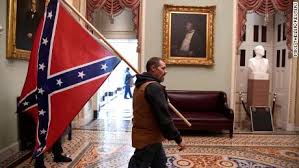
January 9, 2021
Justice Initiative
Foreword
It is difficult to offer an analytical breadth of what has just happened in Washington DC, on January 6, 2021, when a significant number of ‘white’ males and a few females invaded the US Capitol building at the behest of, according to most accounts, the US President – Donald J. Trump.
Regarding violent white male supremacists in America, an activist friend in Mississippi told to me years ago that the Ku Klux Klan (KKK) would not do anything without the approval of the white elite. Then, the late Reverend Joseph Lowery (head of the Southern Christian Leadership Conference – SCLC) mentioned to me that in our contemporary world the KKK leadership is now sitting in corporate board rooms. That being said, President Donald J. Trump, fits this mold of providing leadership to these violent/aggressive white males who invaded the US Capitol.
But this is not new, however. Relevant to the Confederate flag in the Capitol, pictured above, it was largely the non-slave holding white males that led to the US Civil War in the mid-1800’s. These non-slave holding whites wanted slaves as well and they pressured the slave-holding elite in the South for this purpose. This is why the slave-holding whites asked Lincoln to expand slavery to the west. Lincoln refused to do this, thus leading to the Civil War and the Confederacy.
More analysis on this is that it is also thought that many European whites left Europe and came to America to escape the feudalistic hierarchical system in Europe, but the problem is that the feudalistic model ended up being largely the societal framework for America with a hierarchical capitalistic system. So, ‘the struggle continues’ as they say.
Below is an article about the Confederacy and the role of non-slave holding whites in the scenario. I have distributed this article in the past, but it is, unfortunately, all the more relevant for today’s scenario.
___
A New Perspective on the Confederacy
A ‘rich man’s war, poor man’s fight’…. We cursed the war…we cursed the Southern Confederacy. All our pride and valor was gone”
Throughout the South, plantation owners began to fear their slaves and
were shocked at slave resistance to authority. The tables had turned!”
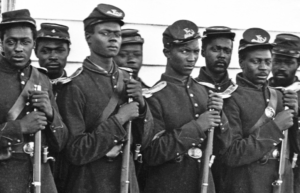
African-American Union soldiers during the US Civil War. Library of Congress
I first wrote this article in 2009 when it was posted on Counterpunch and decided that I would send it out yet again. After the 2009 posting I received numerous emails. One was from a woman in North Carolina who said her ancestors had helped union soldiers and southern confederate deserters to maneuver through the Appalachian Mountains to reach the Union Army lines. Suffice it to say the resistance in the South to the Civil War, as well as anger about the succession from the Union, was immense.
In 2009, the 200th anniversary of the birth of Abraham Lincoln, there was, in fact, an abundance of new scholarship about the 19th century. Some questioned the long-standing myths about Lincoln but also of the Civil War itself and the Confederacy. With an amalgam of earlier scholarship, these studies have included a consideration of the impact of the hedonism of the southern slaveholding planters along with their complicity in the Confederate defeat. In other words, the southern plantation owners worked against their own interests.
This article is, in fact, a brief summary of that complicity and offers a fresh look of the South during the Civil War, which includes narrative on the South’s battle with itself. The focus is mostly about the Civil War and its impact on non-slaveholding southern whites and the role played by African slaves in the Confederate defeat. It is largely taken from the work of historian David Williams at Valdosta State University and his excellent book Bitterly Divided: The South’s Inner Civil War (2008).
The myth of the “Lost Cause” emanating from the defeated South after the Civil War is of an antebellum genteel planter class with its happy contented slaves. ‘God was responsible for slavery’, the elite said, ‘not the South’, as the South was but civilizing an inferior Black race through its contact with the superior white civilization under the auspices of slavery.
The South also maintained, as it re-wrote history, that the white supremacist South was unified in its fight against the marauding North during the Civil War. But there is another story that has been debated for the past century!
What is also so impressive about this understanding of the Civil War in the South was the role played by African slaves. For one, they coordinated from plantation to plantation with codes (such as waving sheets in certain ways) to assist southern deserters and union soldiers not only with food but to reach the Union lines. As Williams wisely notes, the slaves played a significant role in the defeat of the Confederacy.
The Other Story Regarding the Southern White Elite vs Poor Whites
What angered the Southern plantation elite was that with the 1860 election of Lincoln as president, they knew that their hopes of spreading slavery into the western territories were at an end. Lincoln wanted the movement west to provide opportunities for “free labor” white homesteaders to fulfill the Jeffersonian dream of agrarian independence. He did not want slavery in the west nor did he want black folks moving west as freed men. Plus, first and foremost, Lincoln wanted to save the Union.
The South realized with the election that it was not going to have its way with the Republican Party or with the northern Democrats. Karl Marx, as ever the profound analyst, wrote in the German “Die Presse” in 1861, “When the Democrats of the North declined to go on playing the part of the poor whites of the South” the Southern elite took their sword from the scabbard (Marx,1861).
The southern elite also faced a growing poor white population that was becoming harder to control. Poor white voters were increasing and they were making more demands through their franchise. Some have inferred, including Williams, that one reason the South went to war was because the elite were more concerned about poor whites than anything else. “The poor hate the rich” was the cry from South Carolina planter James Henry Hammond, who went on to say that the poor make war on the rich “especially with universal suffrage” (Williams, 2008). The elite began to explore ways to control the vote through class-based restrictions on white suffrage. Placing this “class” antagonism and passion of poor whites into a war was certainly one way to control them and diffuse the anger.
_________
“The poor hate the rich” was the cry from South Carolina planter James Henry Hammond, who went on to say that the poor make war on the rich “especially with universal suffrage”(Williams, 2008)
_________
By expanding further west, the South could also provide more opportunities for poor whites to become slaveholders – at least the hope of it. Slavery, after all, required large acreage and mass labor to be profitable and because land in the South was being “exhausted” by mono-crops, such as cotton, there was less fertile land available. In addition, slaveholders in the South were also in the business of “raising” and “selling” slaves and they wanted to expand that market.
Regarding the slave market, Marx wrote, “Indeed, by force of circumstances South Carolina has already been transformed in part into a slave-raising state, since it already sells slaves to the sum of four million dollars yearly to the states of the extreme South and South-west” (Marx 1861). Marx contended that more territory was, in fact, essential for slavery’s survival.
Marx again writes, “Only by acquisition and the prospect of acquisition of new Territories, as well as by filibustering expeditions, is it possible to square the interests of these poor whites with those of the slaveholders, to give their restless thirst for action a harmless direction and to tame them with the prospect of one day becoming slaveholders themselves” (Marx, 1861).
But slaveholders also had political ambitions and were obviously aspiring imperialists – they wanted their own colonies in the western territories from which they could gain even more control over the U.S. government by adding more states to the slaveocracy.
All over the South, however, there were pockets of communities opposed to the South’s secession and angry at the arrogance of the ruling elite for seceding. The planters after all, controlled the secession conventions and the decisions from the state conventions were not sent to the people for a vote. Some communities even declared secession from the Confederacy itself. Many wanted to avoid what they thought would be an invasion by the North. West Virginia, for one, that was composed largely of small non-slaveholding white farmers, broke off from the planter slaveholding “old” Virginia and sided with the Union.
Ultimately many in the South recognized that the “Confederacy was in a two-front war: one against the North and one against it’s own people” (Williams, 2008).
Resistance from Free and Enslaved Blacks and Poor Whites
It was against this backdrop that the Civil War began and in which Williams writes that the resistance and desertion of poor southern whites during the war was to begin, and of the resistance of southern blacks both slave and free. Most of the Confederate soldiers were non-slaveholding farmers and many acquiesced to the war but conditions intensified and discontent grew everywhere.
It didn’t take long for non-slaveholding white farmers and other poor whites to recognize that this was a rich man’s war being fought by poor men. Even after the firing at Fort Sumter in 1861 that launched the beginning of the war, officers began to go home, but enlisted men were forbidden to resign. Williams reports that the class distinction of this policy was not lost on the southern soldiers.
The non-slaveholding farmers in the war were largely subsistence farmers. They grew what the family needed, rather than commodity mono-crops such as cotton or rice. Further, they didn’t have enough land for these crops nor did they have the labor. Many describe the South’s non-slaveholding yeoman farmers as the essence of the independent agrarian America, like their farming brothers in the North.
As Steven Hahn writes in the ‘The Roots of Southern Populism: Yeoman Farmers and the Transformation of the Georgia Upcountry, 1850-1890‘ the farmers in north Georgia didn’t need the planters telling them what to complain about regarding the Yankees. They simply wanted to be left alone and didn’t want anyone threatening their way of life. But off to war they went. These were not military men, however. They were farmers trying to protect their region from an invading army. Hahn states, however, that the north Georgia yeoman farmers were among the largest community of deserters in the state.
After the first major battle and Confederate victory of the war in the “First Battle of Bull Run” in July 1861, Confederate soldiers left for home in droves to all areas of the South. They had won a major battle and for many the conflict was over.
_________
At one point during the war, according to Williams,
two-thirds of the Confederate army had deserted.
_________
But the fact remains that wives across the region were writing their husbands to come home. They were needed to plant the crops. Not long into the war, families began to struggle and starve and the requests from the families to come home were too compelling. At one point during the war, according to Williams, two-thirds of the Confederate army had deserted. Deserters also needed to hide from the authorities, resulting in an underground system being created throughout the South to assist and hide them, but many were ultimately killed or jailed. The book Cold Mountain (1997) by Charles Frazier and the subsequent movie graphically portray the brutality of Confederate officials in their quest for deserters and the disdain for their families.
But there were also anti-war and peace associations (mostly underground efforts) across the South that organized to protect deserters, help union prisoners escape as well as attempt to undermine the Confederate authority. Examples are the Atlanta Union Circle, the Closet Fellowship in Montgomery, the Union Association in Charleston and countless others.
Assistance to Deserters who were known as “Heroes of America”
Another was the “Heroes of America” formed in North Carolina that spread through South Carolina, Tennessee and Virginia. The group encouraged desertion of Confederate soldiers and promised to protect them once home. All across the ‘mountain South’ there were efforts to assist deserters and those who had ‘run afoul’ of the Confederate authorities to hide and/or leave the South. One guide, “Daniel Ellis, was said to have piloted over four thousand people out of the Confederacy….In north Georgia’s Union County, Austin Mason organized a chain of safe houses to shelter prisoners and deserters as they fled north through the mountains” (Williams, 2008).
_________
“Heroes of America” formed in North Carolina that spread through
South Carolina, Tennessee and Virginia. The group encouraged
desertion of Confederate soldiers and promised to
protect them once home.
_________
Because of the high rate of desertion, in April 1862 the Confederate government under President Jefferson Davis conscripted southerners into the army. It was the first general Conscription Act in the United States. Williams notes that under the Act, men with money could pay a fee to stay out of the military. As a result, bribing officials became a common practice. Plus, there was the most hated provision that allowed slaveholders with 20 slaves or more to be exempted from the military. Tennessee Private Sam Watkins said, “We wanted twenty negroes. Negro property became very valuable, and there was raised the howl of ‘rich man’s war, poor man’s fight’…from this time until the end of the war a soldier was simply a machine. We cursed the war…we cursed the Southern Confederacy. All our pride and valor was gone” (Williams, 2008).
Planters Grew Cotton and Tobacco Rather than Food for the
Confederate Army
Partly to appease the anger over exemption, the planters essentially said that they would grow food for the Confederate army and take care of the farmer’s families. They had the most fertile land and labor after all. But the fact is, the planters did not grow food as promised and southerners starved both at home and in the military. As the price of cotton went up considerably during the war, the planters grew cotton as well as tobacco instead.
…common folk quickly learned that planter patriotism was more apparent than real. Food production never came close to meeting demand because planters devoted far too much acreage to cotton and tobacco. In 1863, cotton production reached its second-highest level on record to that time, declining after that year due in large part to rising slave resistance. Even so, labor devoted to cotton in the growing alone, not to mention processing and transport, amounted to 2.3 million man-years between 1861 and 1864, more than went into defending the Confederacy (Williams, 2008).
In 1863, cotton production reached its second-highest level on record
at that time, declining after that year due in large part to
rising slave resistance.
_________
Further, rather than insisting on the planters growing food, the Confederacy ultimately “impressed” 10% of farm production for the war effort. The problem was that many of those responsible for impressing the food off farms paid little attention to the 10% provision and took everything they could find. This made matters worse, of course!
In the meantime, food riots largely organized by women took place throughout the region from Virginia to Texas.
“It was the same all over the South. A letter to Florida’s Governor Milton reported that starving soldiers families in Hernando County ‘are becoming clamorous for meat, and are killing people’s cows wherever they can get hold of them.’ About a dozen women in Floyd County, Virginia ransacked a Confederate supply depot and stole a large supply of bacon. Fifty miles to the west a dozen mountain women brandishing pistols and knives descended on Abington and looted the town. The raid’s success inspired a second band of women, who shortly afterward, swept through Abingdon taking what was left” (Williams, 2008).
Reverse Underground Railroad: Slaves help ‘white’ deserters
Williams also describes how deserters formed guerrilla groups throughout the south to steal food off plantations and to hide from conscript officers. Some of the groups were composed of escaped slaves and whites that at times resulted in a “reverse underground railroad” as slaves organized to help them. Slaves in plantations helped the deserter groups secure food, helped them hide and also provided information about safe havens north to the Union lines. One Union soldier, John Kellogg, who was assisted by blacks to escape through the Georgia mountains, was impressed with what he called the slave “telegraph line.”
_________
Slaves in plantations helped the deserter groups secure food,
helped them hide and also provided information about
safe havens north to the Union lines.
_________
Black resistance and efforts to undermine the Confederacy were impressive and significant in contributing to the defeat of the Confederacy. They were credited with burning ships and storehouses to spying and destabilizing plantations. Throughout the South, plantation owners began to fear their slaves and were shocked at slave resistance to authority. The tables had turned!
Conclusion
What has been described here is but a summary. Williams outlines in detail the tremendous discontent and suffering during the war. Ultimately, there were 300,000 white southerners who fought for the Union and 200,000 blacks. Nearly a quarter of the Union army was composed of southerners.
Williams ends his book by stating that:
“Most southerners eventually came to feel that they would be better off with the war over and the Union restored. To many the Confederacy was the real enemy. It conscripted their men, impressed their supplies, and starved them out. It favored the rich and oppressed the poor. It made war on those who dared withhold their support and made life miserable for the rest. One South Carolina farmer, after having his livestock impressed, spoke for many when he insisted that “the sooner this damned Government fell to pieces the better it would be for us” (Williams, 2008).
Scholarship on the South from the poor non-slaveholding white perspective is a significant contribution. Interestingly, Williams offers more of a class analysis of the Confederacy than is usually the case. Small white farmers and poor whites generally are stereotyped as those who are browbeaten, controlled and manipulated by the wealthy southern elite with rarely a voice of their own. In this article I have not addressed the issue of race, however, and the attitudes of poor whites toward slavery, which is also important. Nevertheless, this short article is offering a new and refreshing look at challenges by poor whites to the social and economic arrogance of the southern elite during the Civil War.
This is also yet another narrative on the perils of concentrated wealth of the likes of southern slaveholders and unfettered capitalists of today, and the depths to which they will go for their own benefit at the tragic expense of everyone else. In this instance, however, thanks to their greed, the southern slaveholders managed to defeat the very goals they aspired to achieve. While tens of thousands of Southerners and Northerners suffered because of their greed, the fact is that, contrary to their aspirations, and in response to this exploitation, the Civil War slaveholders managed to work against their own interests and instead helped to save the union and end slavery.
Williams also contends that one of the reasons we’ve not heard this version of the war is because both the South and the North have had a vested interest in the myths. The South wanted the world to think that the “white” South stood united against the enemy, which makes it easier to victimize itself. Although the North had its resistance as well, the North has had an interest in a version of the war that stresses its victory over a united South, rather than one that was split apart. Williams and others are now offering scholarship to challenge these myths, and/or have brought forward previous writings on the Confederacy.
References:
*Hahn, Steven. The Roots of Southern Populism: Yeoman Farmers and the Transformation of the Georgia Upcountry, 1850-1890. New York: Oxford University Press, 1983.
*Marx, Karl. The North American Civil War. Die Presse, No. 293, October 25, 1861, in Marx/Engels Collected Works, Volume 19. Moscow: Progress Publishers, 1964.
*Williams, David. Bitterly Divided: The South’s Inner Civil War. New York: Free Press, 2008.
Donations to the Justice project specifically pay for website hosting and maintenance.
The donation button above uses a Paypal processor to reduce administrative costs,
but does not require you to have or to acquire a Paypal account.
You may donate with any credit or debit card of your choice.

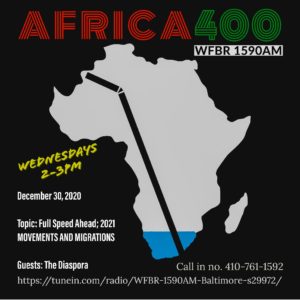
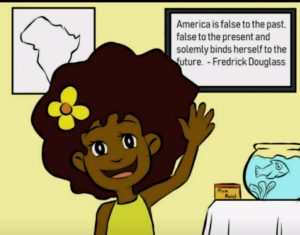 Also, Mama Tomiko and Baba Ty welcome author Shonta Watson to open up the show, discussing her new book, part of the Shea Buttah & The Herbal Kids series™️ that is available now, ready for Kwanzaa. Her Web site is
Also, Mama Tomiko and Baba Ty welcome author Shonta Watson to open up the show, discussing her new book, part of the Shea Buttah & The Herbal Kids series™️ that is available now, ready for Kwanzaa. Her Web site is 
 The December 23, 2020 edition of Africa400 marked the approach of 20 years of
The December 23, 2020 edition of Africa400 marked the approach of 20 years of 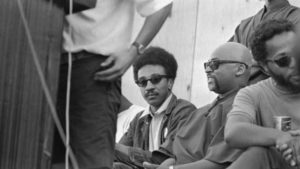 imprisonment for Political Prisoner Imam Jamil Al-Amin, who was once known as H. Rap Brown.
imprisonment for Political Prisoner Imam Jamil Al-Amin, who was once known as H. Rap Brown. 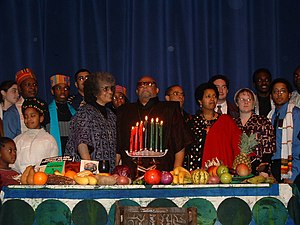 Dr. Karenga wrote an April
Dr. Karenga wrote an April 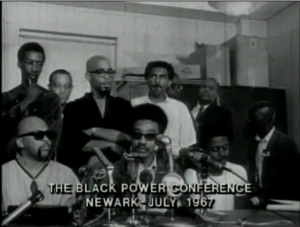
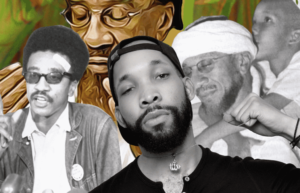
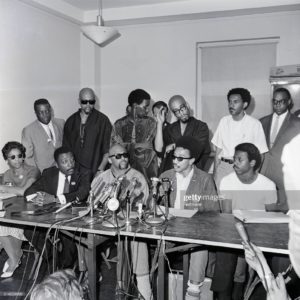 Africa400 can be listened to on the radio in the Glen Burnie and Baltimore, Maryland areas on 1590-AM WFBR. The show is also streamed over the Internet on a variety of platforms, most notably on
Africa400 can be listened to on the radio in the Glen Burnie and Baltimore, Maryland areas on 1590-AM WFBR. The show is also streamed over the Internet on a variety of platforms, most notably on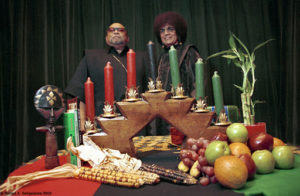
 We now receive regular news and updates from a variety of sources related to African issues. RSS Feeds from the African Union, United Nations and news service AllAfrica.com bring you the most recent news stories from Africa and the World Stage. Check out our
We now receive regular news and updates from a variety of sources related to African issues. RSS Feeds from the African Union, United Nations and news service AllAfrica.com bring you the most recent news stories from Africa and the World Stage. Check out our 

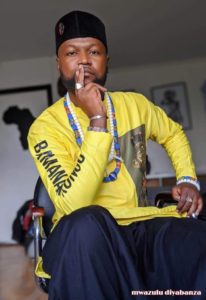 ENGLISH/ENGLAIS
ENGLISH/ENGLAIS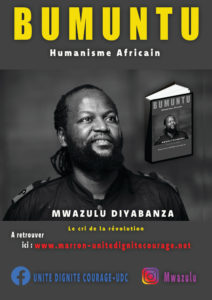

 The November 25, 2020 edition of Africa400 explored the topic of “The Awakening: Children of the Light”.
The November 25, 2020 edition of Africa400 explored the topic of “The Awakening: Children of the Light”.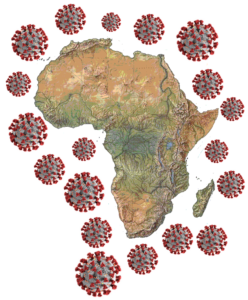 Editor’s Note:
Editor’s Note: